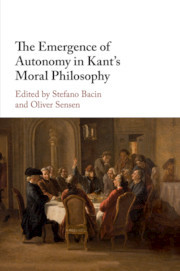Description
The Emergence of Autonomy in Kant's Moral Philosophy
Coordinators: Bacin Stefano, Sensen Oliver
A thorough study of why Kant developed the concept of autonomy, one of his central legacies for contemporary moral thought.
Language: English
Subject for The Emergence of Autonomy in Kant's Moral Philosophy:
The Emergence of Autonomy in Kant's Moral Philosophy
Publication date: 08-2020
Support: Print on demand
Publication date: 08-2020
Support: Print on demand
The Emergence of Autonomy in Kant's Moral Philosophy
Publication date: 10-2018
238 p. · 15.6x23.5 cm · Hardback
Publication date: 10-2018
238 p. · 15.6x23.5 cm · Hardback
Description
/li>Contents
/li>Biography
/li>
Autonomy is one of the central concepts of contemporary moral thought, and Kant is often credited with being the inventor of individual moral autonomy. But how and why did Kant develop this notion? The Emergence of Autonomy in Kant's Moral Philosophy is the first essay collection exclusively devoted to this topic. It traces the emergence of autonomy from Kant's earliest writings to the changes that he made to the concept in his mature works. The essays offer a close historical and philosophical analysis of what prompted Kant to develop his conception of autonomy, charting the historical background which prompted his search, and thoroughly analysing different stages of his writings in order to see which element of autonomy was introduced at which point. The resulting volume will be of interest to both scholars and students of Kantian moral philosophy, as well as to anyone interested in the subject of autonomy.
Introduction Stefano Bacin and Oliver Sensen; 1. How is moral obligation possible? Kant's 'principle of autonomy' in historical context Heiner F. Klemme; 2. Anticipations of autonomy: freedom, obligation, and the concept of a world in Kant's writings of the Mid-1750s to Mid-1760s Susan Meld Shell; 3. Autonomy and moral rationalism: Kant's criticisms of 'rationalist' moral principles (1762–85) Stefano Bacin; 4. Autonomy and moral empiricism: Kant's criticism of sentimentalist moral principles (1762–85) Georg Mohr; 5. Elements of autonomy in Kant's Lectures on Ethics (1770–80) Oliver Sensen; 6. Emerging autonomy: dealing with the inadequacies of the 'canon' of the Critique of Pure Reason (1781) Jens Timmermann; 7. Autonomy and the legislation of laws in the Prolegomena (1783) Eric Watkins; 8. How can freedom be a law to itself? The concept of autonomy in the 'introduction' to the Naturrecht Feyerabend lecture notes (1784) Marcus Willaschek; 9. Moral autonomy as political analogy: self-legislation in Kant's Groundwork and the Feyerabend lectures on natural law (1784) Pauline Kleingeld; 10. What emerged: autonomy and heteronomy in the Groundwork and second Critique Andrews Reath; 11. Kant's threefold autonomy after the Groundwork: reason's own law-giving as our own cosmopolitan law-giving Pierre Keller.
Stefano Bacin is Senior Assistant Professor of History of Philosophy at the University of Milan. He is the author of Il senso dell'etica. Kant e la costruzione di una teoria morale (2006) and Fichte in Schulpforta (1774–1780) (2008) and is co-editor, with Marcus Willaschek, Georg Mohr and Jürgen Stolzenberg, of the Kant-Lexikon (2015).
Oliver Sensen is Associate Professor and Director of Graduate Studies in Philosophy at Tulane University, Louisiana. He is the Vice President of the North American Kant Society, and the author of Human Dignity (Cambridge, forthcoming), Kant on Human Dignity (2011), as well as the editor of Kant on Moral Autonomy (Cambridge, 2012).
Oliver Sensen is Associate Professor and Director of Graduate Studies in Philosophy at Tulane University, Louisiana. He is the Vice President of the North American Kant Society, and the author of Human Dignity (Cambridge, forthcoming), Kant on Human Dignity (2011), as well as the editor of Kant on Moral Autonomy (Cambridge, 2012).
© 2024 LAVOISIER S.A.S.




